Introduction
Enterprise marketing refers to generic marketing strategies designed to meet the needs of big organizations. Moreover working across various regions, industries, and even countries. Enterprises require a comprehensive and scalable marketing approach as compared to small businesses. Which further addresses diverse markets and ultimately long-term growth. From brand management to customer engagement and lead generation, enterprise marketing aligns with its marketing efforts. Leading towards the goals of the organization.
This blog takes us through some of the key strategies that any enterprise must use to build a stronger brand. Specifically for improving customer engagement, generating leads, and business growth in 2025
What is Enterprise Marketing?
Enterprise marketing is a broad strategy, which is more about how to promote and grow the brand nationally or globally. It involves creating very integrated strategies that focus on the specifics and issues. These are related to larger organizations, including different audiences, several products, and operations in numerous regions or countries.
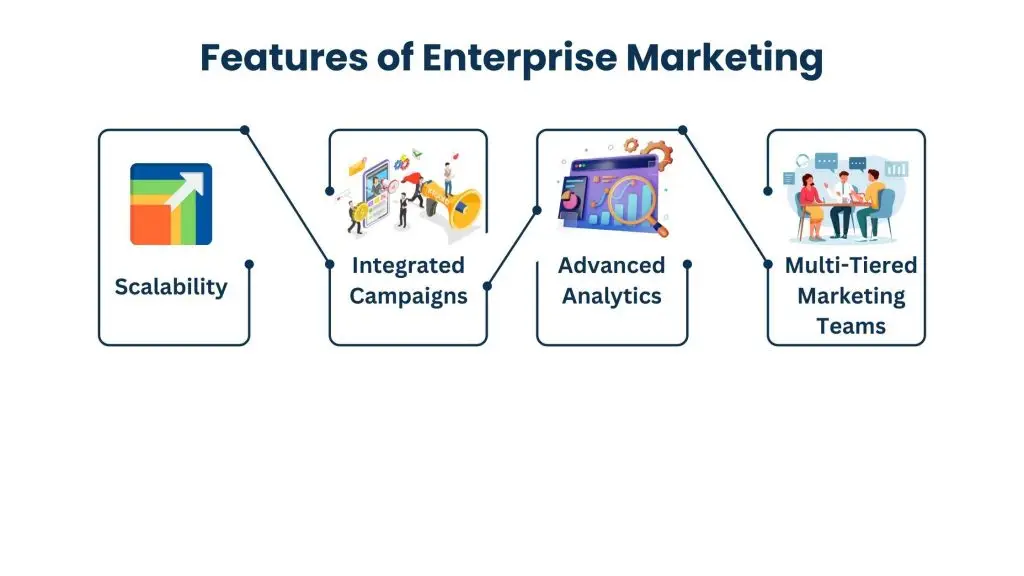
Features of Enterprise Marketing:
- Scalability: As the business grows or expands into new markets, marketers efficiently scale their efforts.
- Integrated Campaigns: Marketers integrate every digital, social, conventional, and experiential method of marketing across all channels.
- Advanced Analytics: This involves using data and analytics technologies to judge the effectiveness of marketing activities with data-informed decisions.
- Multi-Tiered Marketing Teams: This involves the integration of several groups and departments. Additionally, ensuring the marketing goals and objectives are in line with the general business goals and objectives.
Enterprise marketing requires a strategic approach and a long-term vision for the company’s success. Along with ensuring the sustainability of the brand while facing difficulties created because it is operating at scale.
Brand Identity Unification
Enterprise marketing expresses a cohesive brand identity uniformly through all channels and markets. Large corporations consistently maintain their brand messages and visual identities at all times and in every place. It is only through a harmonious brand experience that trust and recognition can develop, which are essential for long-term relations with clients.
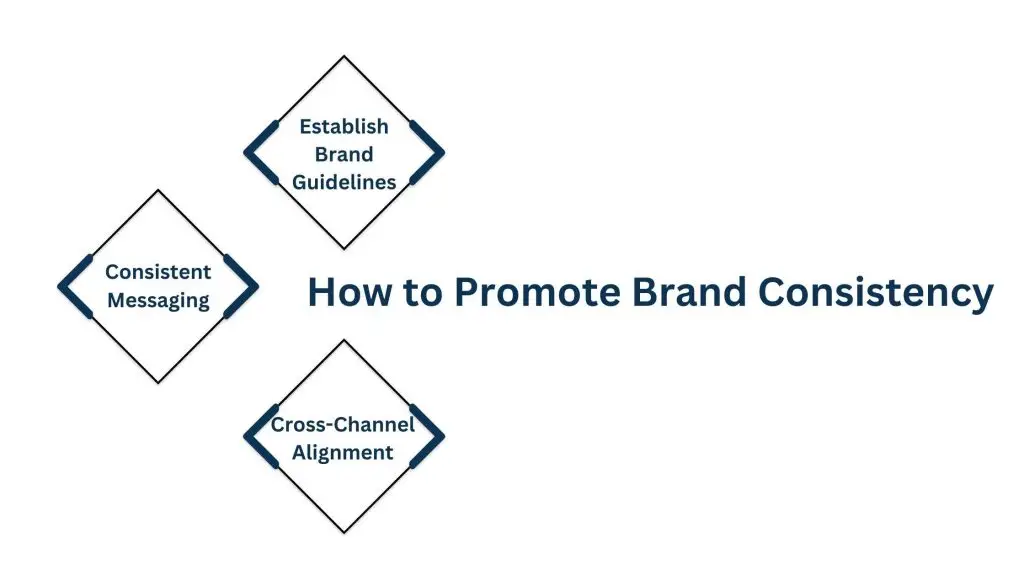
How to Promote Brand Consistency:
- Establish Brand Guidelines: Define brand guidelines that, at the minimum, include logos, color schemes, tone of voice, and messaging for consistency. And these guidelines must be followed across all platforms.
- Consistent Messaging: Ensure marketing materials, advertisements, and social media posts all deliver one core brand message.
- Cross-Channel Alignment: Implement multi-channel outreach, but ensure that content is aligned with overall brand goals. Also you can think about social media marketing, email marketing, and old-fashioned advertising.
Consistent brand presence not only proves to be a help in developing trust among current customers but also among potential customers. Thereby strengthening recognition and loyalty regarding the brand.
Also Read: Virtual Assistant Services in Esbjerg
Data-Driven Marketing
Data is an important part of corporate marketing as it gives companies the ability to make strategic decisions in marketing. With several marketing channels creating huge data, analytics tools can be used to track the performance and campaigns. That also can be optimized and even customized in real-time by understanding customer behavior.
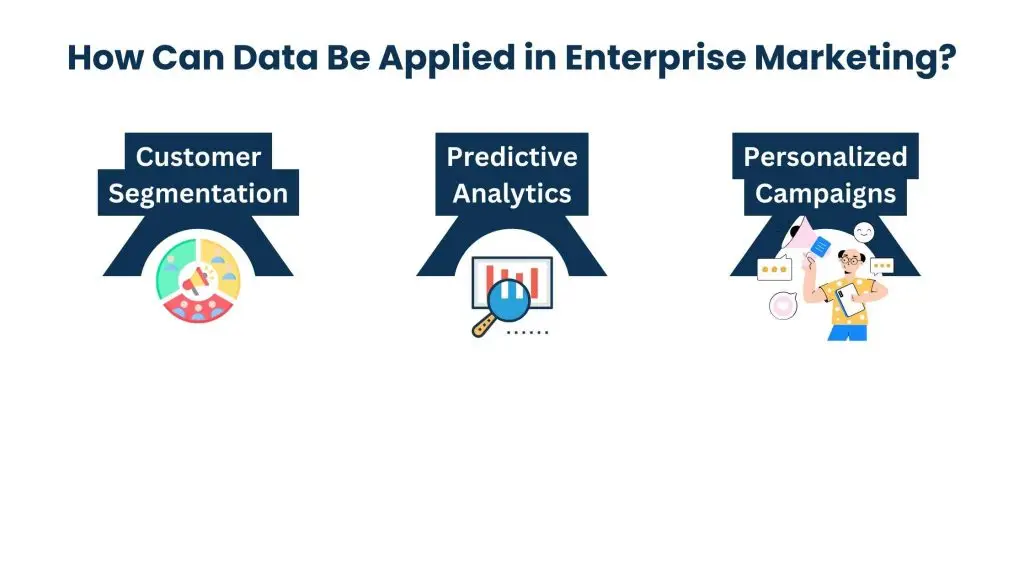
How Can Data Be Applied in Enterprise Marketing?
- Customer Segmentation: By using the information that will be gathered on customers, defining different audience segments based on their demographics and other particular purchase and behavior patterns for an extensively targeted marketing campaign will be possible.
- Predictive Analytics: Predict customer needs with the help of predictive analytics by forecasting future trends and helping create relevance and impact in marketing.
- Personalized Campaigns: Personalize the marketing experiences based on customer preferences and behavior, thereby assuring increased engagement and conversion.
The adoption of data and analytics allows companies to make strategic decisions that better enhance a campaign, leading to maximum returns on investment for their marketing initiatives.
Scalability of Marketing Effort
Enterprise marketing also significantly faces scaling efforts in making marketing efforts efficient across markets and regions. Large corporations generally cater to diverse customer bases across markets and geographies, hence requiring flexibility and scalability in marketing strategies.
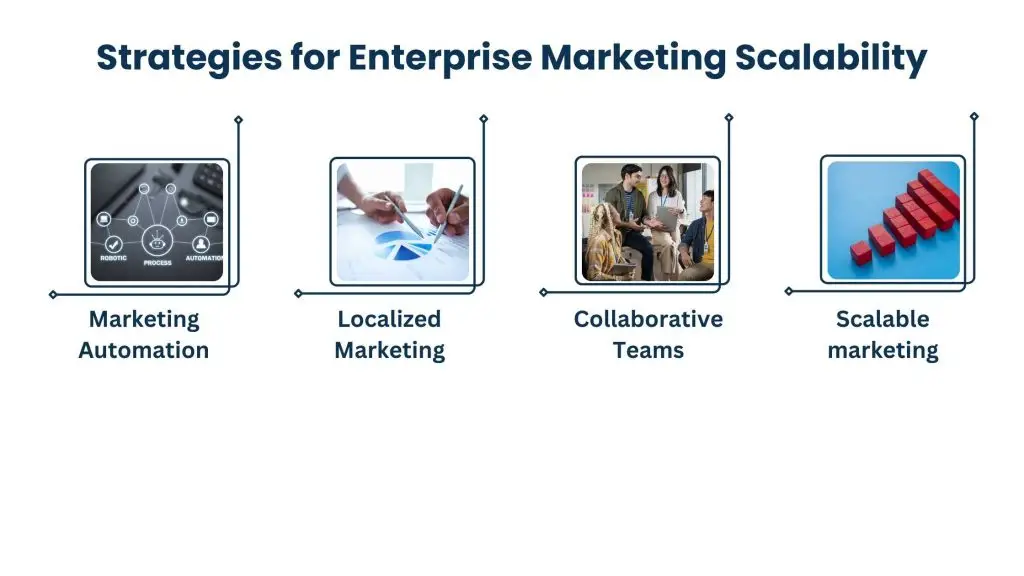
Strategies for Enterprise Marketing Scalability:
- Marketing Automation: Automating repetitive tasks using automation systems, like lead nurturing, social media posting, and email marketing, is known as marketing automation.
- Localized Marketing: Localized marketing entails adjusting marketing strategies to local markets while maintaining brand relevance. This includes localizing graphics, translating text, and messaging to appeal to particular cultural or regional preferences.
- Collaborative Teams: Motivate the local marketing team to collaborate with the global marketing teams so that the campaigns can follow the overall marketing strategy. Further, addressing the needs of the local markets.
- Scalable marketing: Scalable marketing ensures an enterprise is large and prominent in many markets without wasting resources.
Also Read: Virtual Assistant Services in Horsens
Account-Based Marketing (ABM)
One such popular enterprise marketing tactic is account-based marketing or ABM. ABM specifically focuses on a chosen group of high-value accounts rather than growing as much as possible. It therefore involves tailoring your marketing campaign to target specific key accounts that involve multiple decision-makers in the organization. Such a focused approach has then been known for significantly changing the turnaround in terms of both engagement and conversions.
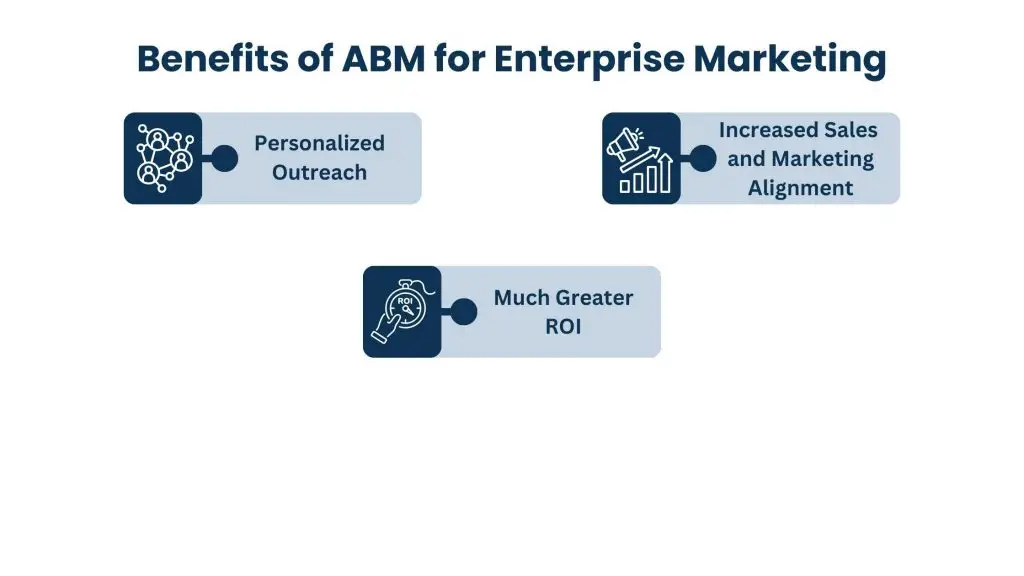
Benefits of ABM for Enterprise Marketing:
- Personalized Outreach: ABM is an avenue that allows marketing teams to tailor their content and messaging to be account-specific. It specifically mirrors the pain points and goals of that particular account.
- Increased Sales and Marketing Alignment: ABM encourages the sales and marketing teams to be much more closely aligned. As both work on priority accounts.
- Much Greater ROI: Above all, ABM targets more high-value accounts. It often returns a much greater level of investment compared to traditional broad-based marketing campaigns.
ABM introduces companies closer to key clients and, therefore, creates a better relationship. Hence, more loyal and higher revenue-generating customers are achieved.
Omnichannel Marketing for Enterprise Success
Omnichannel marketing is another area in which enterprise marketers have to focus because it provides a seamless customer experience across all touchpoints. Be it online or offline or in social media, the expectation is that your customers will have an edge where they get a consistent experience with your brand. Further creating an integrated experience across multiple channels for customers and gives them one journey.
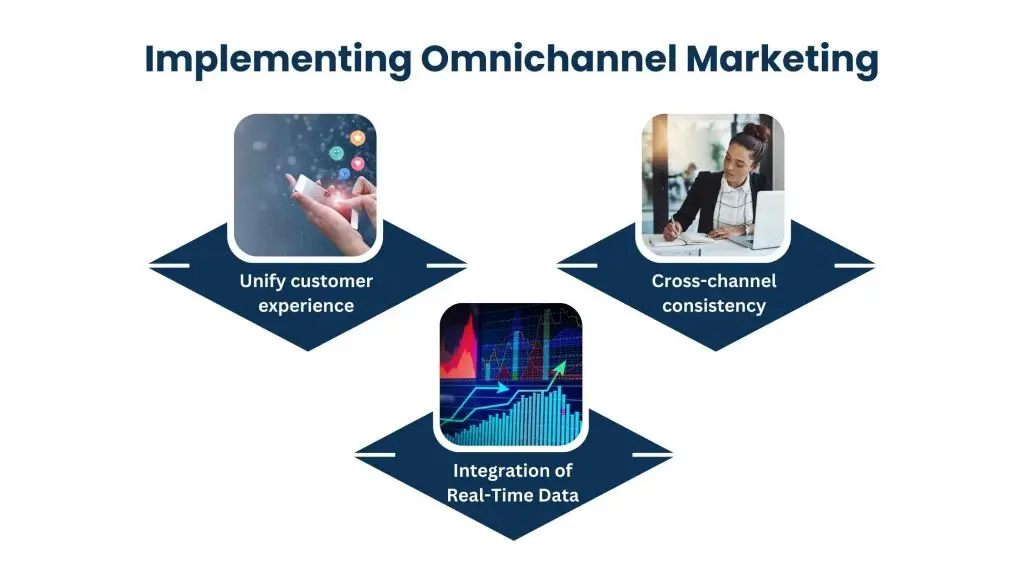
Implementing Omnichannel Marketing:
- Unify customer experience: All your interactions with a customer, whether through email, social media, websites, or in-store touch points, are connected and seamless to each other.
- Cross-channel consistency: For better brand identity and a holistic customer experience guarantee that the messaging, visuals, and branding are consistent across all touchpoints.
- Integration of Real-Time Data: Using real-time data built from several channels, you understand customer behavior and preferences, which would then allow you to optimize the customer journey along every touchpoint.
Omnichannel marketing helps businesses build cohesive, engaging experiences that build customer satisfaction and loyalty.
Advanced Analytics for Measuring Success
The success of an enterprise marketing strategy depends on the continuous measurement of its success and data-driven adjustments to it. Advanced analytics allow enterprises to track performance in multiple campaigns, channels, and regions; thus, marking how things work and areas to be improved so one can make informed decisions about how to optimize future campaigns.
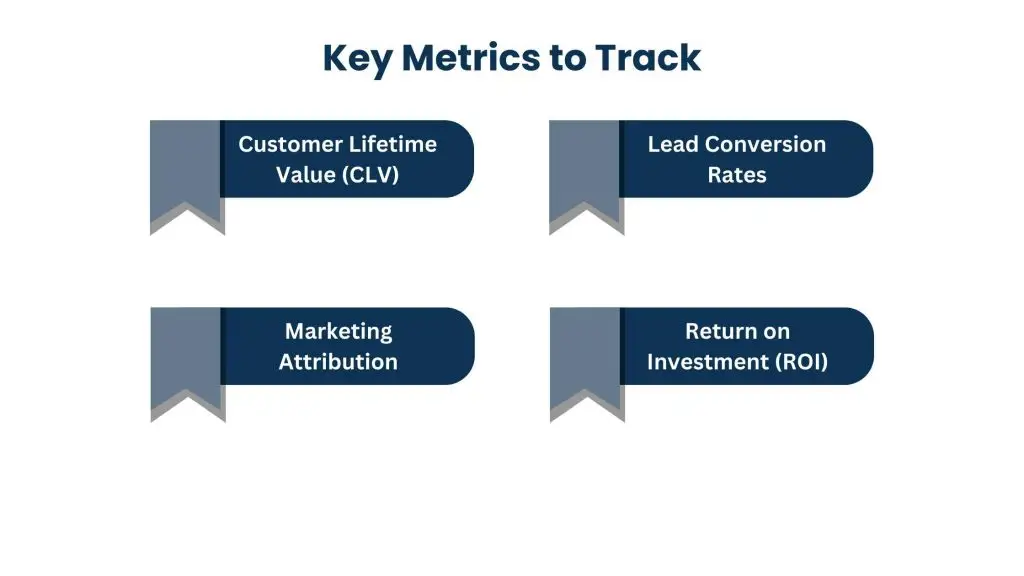
Key Metrics to Track:
- Customer Lifetime Value (CLV): Measure the long-term worth of a customer to ensure that the marketing effort is creating long-term relationships.
- Lead Conversion Rates: Understand the number of leads generated by campaigns that reach the ultimate point of being paying customers.
- Marketing Attribution: Understand the most important channels and touch points driving the most value across the customer journey through attribution models, which assign credit.
- Return on Investment (ROI): Measure the efficiency of your marketing strategies in terms of revenues generated.
Continued monitoring of such things can make enterprises readjust their marketing strategies when required and, therefore, can have success over time.
Conclusion
Enterprise marketing is a rather complex and evolving discipline in which much needs to be planned so as to make it scalable and understand customer behavior. With brand consistency, data-driven marketing, scalable efforts, and implementing omnichannel, large organizations have been able to engage their target audience quite effectively in order to drive long-term growth. Whether personal ABM campaigns or advanced analytics to measure success, these strategies will definitely keep large organizations going in this unprecedented marketing landscape.
About Us
Tasks Expert offers top-tier virtual assistant services from highly skilled professionals based in India. Our VAs handle a wide range of tasks, from part time personal assistant to specialized services like remote it support services, professional bookkeeping service etc. Furthermore, it helps businesses worldwide streamline operations and boost productivity.
Ready to elevate your business? Book a Call and let Tasks Expert take care of the rest.









